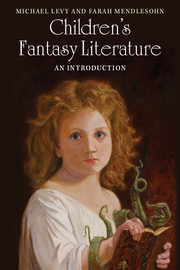Book contents
- Frontmatter
- Contents
- Acknowledgements
- Introduction
- 1 How fantasy became children's literature
- 2 Fairies, ghouls and goblins: the realms of Victorian and Edwardian fancy
- 3 The American search for an American childhood
- 4 British and Empire fantasy between the wars
- 5 The changing landscape of post-war fantasy
- 6 Folklore, fantasy and indigenous fantasy
- 7 Middle Earth, medievalism and mythopoeic fantasy
- 8 Harry Potter and children's fantasy since the 1990s
- 9 Romancing the teen
- Notes
- Further Reading
- Index
- References
7 - Middle Earth, medievalism and mythopoeic fantasy
Published online by Cambridge University Press: 05 April 2016
- Frontmatter
- Contents
- Acknowledgements
- Introduction
- 1 How fantasy became children's literature
- 2 Fairies, ghouls and goblins: the realms of Victorian and Edwardian fancy
- 3 The American search for an American childhood
- 4 British and Empire fantasy between the wars
- 5 The changing landscape of post-war fantasy
- 6 Folklore, fantasy and indigenous fantasy
- 7 Middle Earth, medievalism and mythopoeic fantasy
- 8 Harry Potter and children's fantasy since the 1990s
- 9 Romancing the teen
- Notes
- Further Reading
- Index
- References
Summary
As we discussed in Chapter 5, the influence of C. S. Lewis changed the shape of British children's fantasy, pushing it towards portals, myth-magic and destinarianism, and perhaps most important, towards what Marek Oziewicz has argued is the dominance of the mythopoeic; that is, the making of myths. As children's and teen fantasy developed in the 1960s, this element came sufficiently to the fore that it began to dominate the public perception of what fantasy was. In his book One Earth, One People (2008), Oziewicz writes of almost all the authors we will be discussing in this chapter that they have ‘strong convictions about fantasy as fulfilling vital human needs, as concerned with human values, and spiritual yearnings, and as grounded in archetypal patterns and poetic mode[s] of expression’. They also have an intense sense of seriousness, suggesting that the fantasy matters in a way that was absent from pre-1950s fantasy.
This sense of scaling up, of fantasy as containing universals, became in the 1960s and 1970s one of the dominant ways of critiquing the genre: it is no longer enough for the fantastic to disrupt the lives of children, for them to learn to negotiate the world around them; it is no longer enough for fantasy to intrude. Fantasy after fantasy has world-shattering consequences. The effect of this change can, perhaps, be best seen in the difference between the first three Enid Blytonesque Harry Potter books, and the following four, which moved us from the amusement of Hogwarts into the cataclysmic consequences of Lord Voldemort's war.
The changes that took place in fantasy in this period are several: first, the decisive move towards full secondary worlds totally separate from our own, like Middle Earth (although some, like Narnia, remain accessible through a portal); second, the increasing integration of myth and legend drawn by the British from their native traditions and those of Scandinavia, and by Americans, Canadians and Australians from much the same pool, until well into the 1990s; and third, the increasing role of the quest structure. This last narrative trajectory caught on substantially in the United States long before it became a strong trope in British and Commonwealth literature.
- Type
- Chapter
- Information
- Children's Fantasy LiteratureAn Introduction, pp. 133 - 160Publisher: Cambridge University PressPrint publication year: 2016



